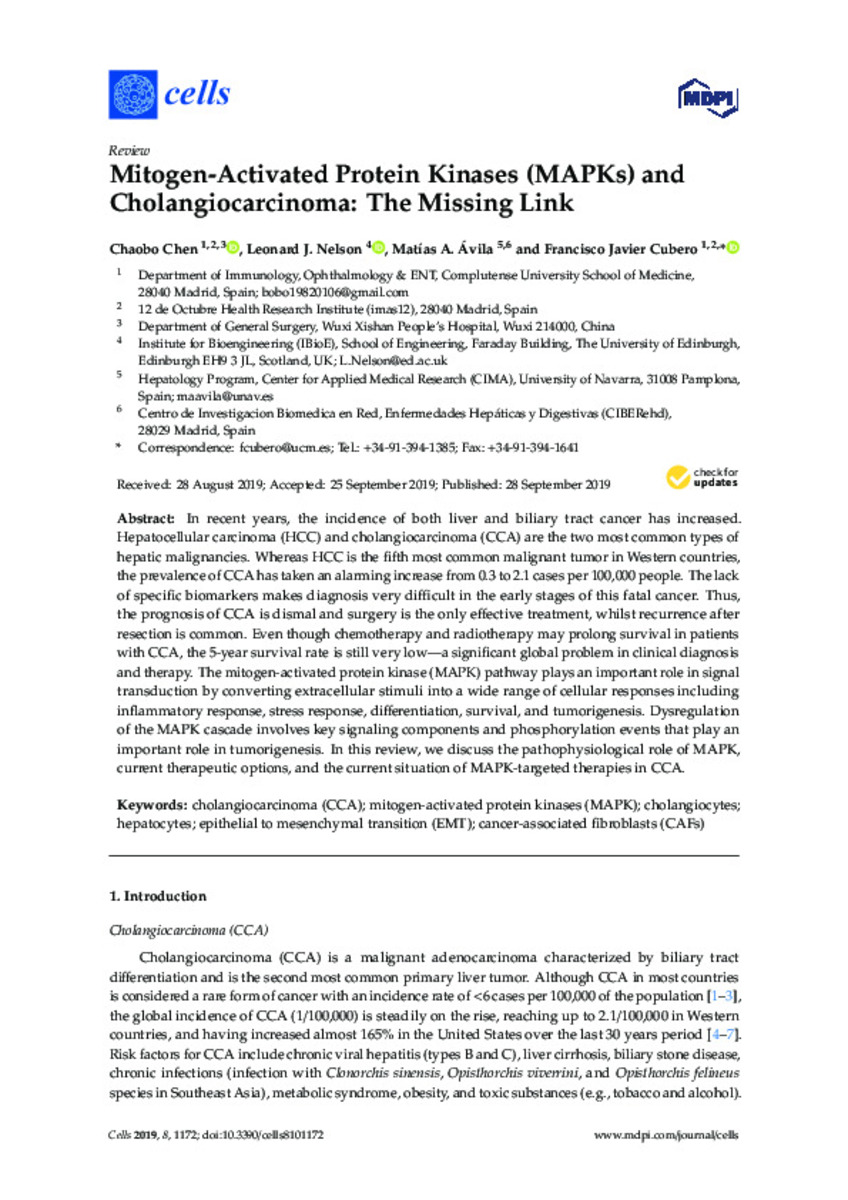Full metadata record
| DC Field | Value | Language |
|---|---|---|
| dc.creator | Chen, C. (Chaobo) | - |
| dc.creator | Nelson, L.J. (Leonard J.) | - |
| dc.creator | Avila, M.A. (Matías Antonio) | - |
| dc.creator | Cubero, F.J. (Francisco Javier) | - |
| dc.date.accessioned | 2021-10-07T10:39:55Z | - |
| dc.date.available | 2021-10-07T10:39:55Z | - |
| dc.date.issued | 2019 | - |
| dc.identifier.citation | Chen, C. (Chaobo); Nelson, L.J. (Leonard J.); Avila, M.A. (Matías Antonio); et al. "Mitogen-activated protein kinases (MAPKs) and cholangiocarcinoma: the missing Link". Cells. 8 (10), 2019, | es_ES |
| dc.identifier.issn | 2073-4409 | - |
| dc.identifier.uri | https://hdl.handle.net/10171/62156 | - |
| dc.description.abstract | In recent years, the incidence of both liver and biliary tract cancer has increased. Hepatocellular carcinoma (HCC) and cholangiocarcinoma (CCA) are the two most common types of hepatic malignancies. Whereas HCC is the fifth most common malignant tumor in Western countries, the prevalence of CCA has taken an alarming increase from 0.3 to 2.1 cases per 100,000 people. The lack of specific biomarkers makes diagnosis very difficult in the early stages of this fatal cancer. Thus, the prognosis of CCA is dismal and surgery is the only effective treatment, whilst recurrence after resection is common. Even though chemotherapy and radiotherapy may prolong survival in patients with CCA, the 5-year survival rate is still very low—a significant global problem in clinical diagnosis and therapy. The mitogen-activated protein kinase (MAPK) pathway plays an important role in signal transduction by converting extracellular stimuli into a wide range of cellular responses including inflammatory response, stress response, differentiation, survival, and tumorigenesis. Dysregulation of the MAPK cascade involves key signaling components and phosphorylation events that play an important role in tumorigenesis. In this review, we discuss the pathophysiological role of MAPK, current therapeutic options, and the current situation of MAPK-targeted therapies in CCA. | es_ES |
| dc.description.sponsorship | This work was supported by the MINECO Retos SAF2016-78711, EXOHEP-CM S2017/BMD-3727, NanoLiver-CM Y2018/NMT-4949, UCM-25-2019, ERAB EA/18-14, AMMF 2018/117, and COST Action CA17112. We also acknowledge the funding from the Instituto de Salud Carlos III grant FIS16/01126, AECC grant for rare tumors 2017, Hepacare Project “la Caixa”, and Gobierno de Navarra Salud Grant 58/17. F.J.C. is a Ramón y Cajal Researcher (RYC-2014-15242) affiliated with the UCM group “Lymphocyte Immunobiology”, No. 920631 (imas12-associated, Ref. IBL-6) and a Gilead Liver Research Scholar 2018. | es_ES |
| dc.language.iso | eng | es_ES |
| dc.publisher | MDPI AG | es_ES |
| dc.rights | info:eu-repo/semantics/openAccess | es_ES |
| dc.subject | Cholangiocarcinoma (CCA) | es_ES |
| dc.subject | Mitogen-activated protein kinases (MAPK) | es_ES |
| dc.subject | Cholangiocytes | es_ES |
| dc.subject | Hepatocytes | es_ES |
| dc.subject | Epithelial to mesenchymal transition (EMT) | es_ES |
| dc.subject | Cancer-associated fibroblasts (CAFs) | es_ES |
| dc.title | Mitogen-activated protein kinases (MAPKs) and cholangiocarcinoma: the missing Link | es_ES |
| dc.type | info:eu-repo/semantics/article | es_ES |
| dc.identifier.doi | 10.3390/cells8101172 | - |
| dadun.citation.number | 10 | es_ES |
| dadun.citation.publicationName | Cells | es_ES |
| dadun.citation.volume | 8 | es_ES |
Files in This Item:
Statistics and impact
Items in Dadun are protected by copyright, with all rights reserved, unless otherwise indicated.






